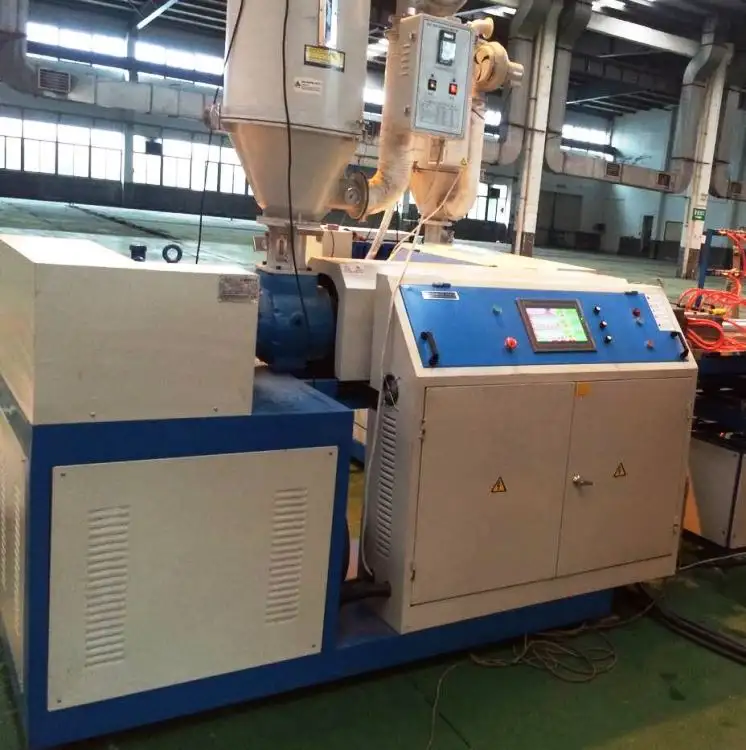Pipe Making Machine
Industry-specific attributes
Screw Design
Single-screw
Screw L/D Ratio
28
Other attributes
Condition
New
Plastic Processed
PE
Application
PIPE
Showroom Location
None
Place of Origin
Zhejiang, China
Weight
400KG
Warranty
1 Year
Key Selling Points
Automatic
Applicable Industries
Manufacturing Plant
Video outgoing-inspection
Provided
Warranty of core components
1 Year
Core Components
Bearing, Motor, Gear, PLC, Engine, Gearbox, Screw
Machinery Test Report
Provided
Screw Material
38CrMoALA
Screw diameter (mm)
50 mm
Screw Speed (rpm)
70 rpm
Brand Name
JT
Voltage
380V/220V/440V
Dimension(L*W*H)
2500X800X1700MM
Power (kW)
7.5
After-sales Service Provided
Engineers available to service machinery overseas
Product name
Good performance HDPE pipe making machine
Keywords
HDPE pipe making machine
Material Processed
HDPE
Voltage
380V/220V/440V
Motor power
7.5KW/10hp
Warranty
1 year
capacity
30-50kg/h
Product
PP PE PVC single wall corrugated pipe making machine pipe machine
Screw diameter
50MM
Packaging & delivery
Package Type:
Good performance HDPE pipe making machine Packed by plastic films, wooden pallets, wooden boxes as per customers' requirements
Supply Ability
Supply Ability
10 Set/Sets per Month
Product Desription
Let us contribute to environmental protection to a force!

⇒Good performance HDPE pipe making machine
It is mainly composed of the extruder, extruder die-head, vacuum tank, haul off, and winding machine/auto cutting machine
Use: HDPE pipe making machine can produce one layer/two layers HDPE pipes, good performance and low noise.



Pipe Making Machine - An Overview
A pipe making machine is an essential equipment used widely in various industries for manufacturing high quality pipes and tubes. This article provides an in-depth look at pipe making machines and their working principles.
Introduction to Pipe Making Machines
Pipe making machines are available in a wide range of specifications and capabilities to produce pipes and tubes from metals, plastics, concrete and other materials. Based on the pipe manufacturing process, these machines can be broadly classified into:
Extrusion Pipe Making Machines: Used for manufacturing seamless pipes and tubes from metals and plastics using the extrusion process.
Roll Forming Pipe Mills: Employ a series of rolling stands to progressively form a flat strip into a tubular pipe shape.
Spiral Pipe Mills: Produce large diameter steel pipes by winding and welding a steel strip in a spiral shape.
Longitudinal Pipe Welding Machines: Form pipes by bending a sheet and welding the seam along the length.
Working Principles
The fundamental working principle involves forming the material into a tubular pipe shape and welding or bonding the edges together. However, the exact process varies for different materials and pipe specifications.
Extrusion machines use a perforated die to push melted material through and form a seamless pipe. Roll forming machines pass sheet metal strips through a series of roller dies to gradually shape it into a pipe. Longitudinal welding machines first form a sheet into a tube using rollers and then weld the abutting edges.
Spiral welding is a cost-effective process for large diameter pipes. A spiral forming mill bends a steel plate into a U shape using rollers and guides it through successive welding stations to join the seam.
Key Components
Some of the main components of a pipe making machine include:
Feed Equipment: To supply raw material sheet, plate or strip stock.
Forming Assembly: Rollers, guides and mandrels that form the material into tubular shape.
Welding Equipment: To weld the abutting edges and obtain a continuous pipe form.
Sizing Tools: For calibrating and sizing the pipe to desired dimensions.
Cutting Tools: To cut the pipe into specified lengths.
Conveying System: Roller tables and transfer mechanisms to move pipe.
Control System: To monitor and control the production parameters.
Applications and Industries
Some major application areas and industries that utilize pipe making machines include:
Oil and gas pipelines
Construction and infrastructure
Automotive and machinery
Chemical and petrochemical
Power plants
Agriculture and irrigation
The table below shows the common pipe materials and dimensions manufactured:
| Material | Outer Diameter Range | Wall thickness |
|---|---|---|
| Carbon steel | 1 inch - 100 inches | Schedule 10 to Schedule XH |
| Stainless steel | 0.5 inch - 36 inches | Schedule 5S to Schedule 160 |
| Plastics/PVC | 0.5 inch - 24 inches | Schedule 40 to Schedule 120 |
| Concrete | 12 inches - 60 inches | 2 inches - 6 inches |
Conclusion
Pipe making machines are indispensable equipment for the manufacturing sector with applications across many industries. Proper selection of the machine type and its capabilities is vital based on the application, material and pipe specifications. With rising global demand, pipe mills will continue to evolve with better automation and innovations.
 Get a quote
Get a quote









